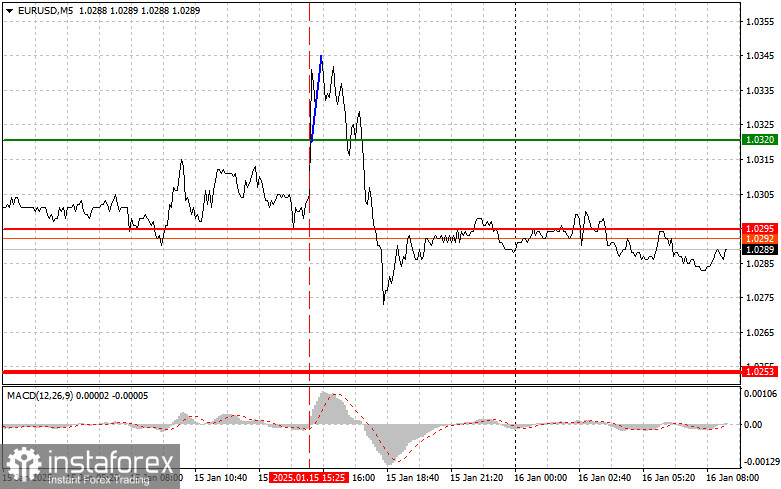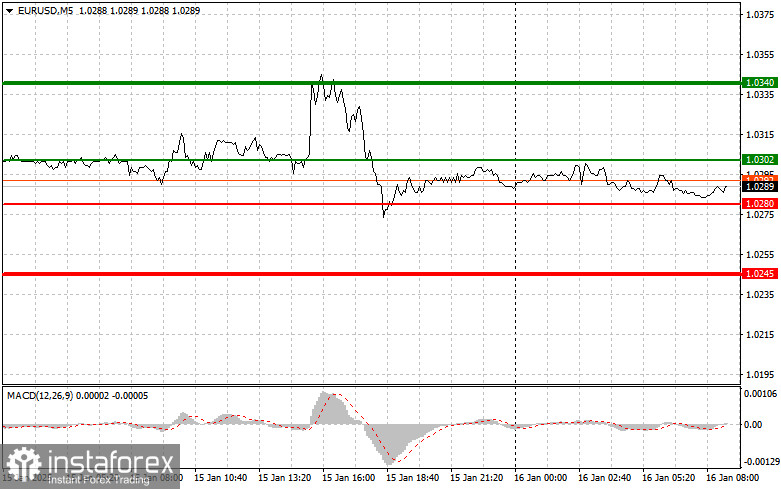Analysis of Trades and Trading Tips for the Euro
The test of the 1.0320 level in the second half of the day coincided with the MACD indicator beginning to move upward from the zero mark, confirming a valid market entry point. As a result, the pair moved upward by approximately 25 pips before renewed pressure on the euro emerged.
Yesterday's somewhat ambiguous US inflation data increased market uncertainty, which ultimately applied pressure to risk assets, including the euro. Headline inflation rose by 0.4%, matching both forecasts and the previous reading of 0.3%. However, core inflation fell to 3.2% year-over-year, slightly below the expected 3.3%.
Today, the focus will be on the Eurozone trade balance figures, which could significantly impact currency exchange rates and economic forecasts. A decline in exports or an increase in imports might indicate regional economic weakness, potentially leading to a depreciation of the euro. This would be unwelcome news for European policymakers, especially in light of anticipated tariffs from Trump.
The German CPI figures are also critical for shaping monetary policy. Persistently high or increasing inflation could prompt the European Central Bank (ECB) to adopt a more cautious approach to rate cuts. Conversely, weaker data might positively influence expectations regarding future ECB actions. Additionally, the minutes from the ECB's monetary policy meeting will attract traders' attention.
For today's trading, priority will be given to implementing Scenarios #1 and #2.

Buy Signal
Scenario #1: Today, buying the euro is possible at the 1.0302 level (green line on the chart), targeting a rise to 1.0340. At 1.0340, plan to exit the market and simultaneously sell the euro in the opposite direction, expecting a 30–35 pips movement from the entry point. Expect euro growth in the first half of the day only after positive data. Important: Before entering, ensure that the MACD indicator is above the zero mark and starting its upward movement.
Scenario #2: I am also going to buy the euro today in case of two consecutive tests of the price at 1.0280 at the moment when the MACD indicator will be in the oversold area. This will limit the downside potential of the pair and will lead to an upward reversal of the market. We can expect growth to the opposite levels of 1.0302 and 1.0340.
Sell Signal
Scenario #1: I plan to sell the euro after reaching 1.0280 (red line on the chart). The target will be the level of 1.0245, where I will exit the market and buy immediately in the opposite direction (calculation on the movement of 20-25 pips in the opposite direction from the level). The pressure on the pair will return at any moment. Important! Before selling, ensure that the MACD indicator is below the zero mark and is just starting to decline from it.
Scenario #2: I am also going to sell the euro today in case of two consecutive price tests of 1.0302 at the moment when the MACD indicator is in the overbought area. This will limit the pair's upward potential and lead to a market reversal downwards. We can expect a decline to the opposite levels of 1.0280 and 1.0245.

Chart Notes
- Thin green line: Entry price for buying the trading instrument.
- Thick green line: A suggested target for Take Profit or manually locking in profits, as further growth above this level is unlikely.
- Thin red line: Entry price for selling the trading instrument.
- Thick red line: A suggested target for Take Profit or manually locking in profits, as further decline below this level is unlikely.
- MACD Indicator: Critical for identifying overbought and oversold zones to guide market entry decisions.
Important Note for Beginner Traders
- Always approach market entry decisions cautiously.
- Avoid trading during major news releases to sidestep volatile price swings.
- If trading during news releases, always set stop-loss orders to minimize losses.
- Trading without stop-loss orders or money management practices can quickly deplete your deposit, especially when using large volumes.
- A clear trading plan, like the one outlined above, is essential for successful trading. Spontaneous trading decisions based on current market conditions are inherently disadvantageous for intraday traders.





















